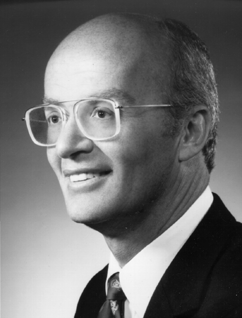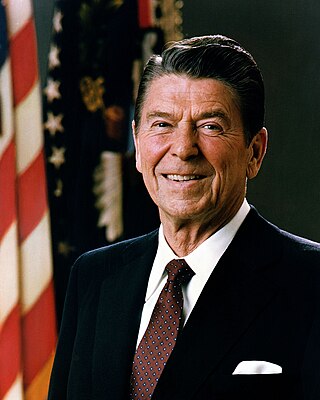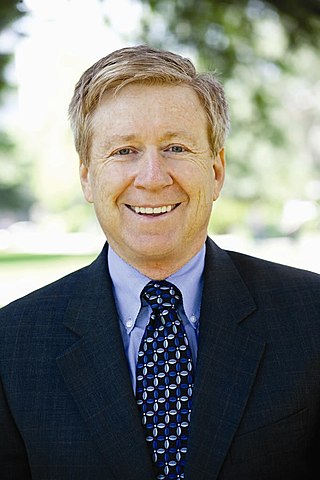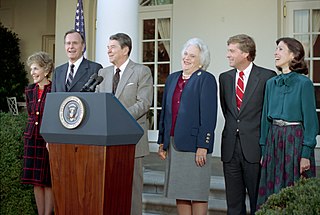Related Research Articles

The Iran–Contra affair,also referred to as the Iran–Contra scandal,the Iran Initiative,or simply Iran–Contra,was a political scandal in the United States that centered around the revelation that senior officials in the Ronald Reagan administration secretly facilitated the sale of arms to Iran from 1981 to 1986. As Iran was subject to an arms embargo at the time of the scandal,the sale of arms was deemed illegal. The administration hoped to use the proceeds of the arms sale to fund the Contras,an anti-Sandinista rebel group in Nicaragua. Under the Boland Amendment,further funding of the Contras by legislative appropriations was prohibited by Congress,but the Reagan administration figured out a loophole by secretively using non-appropriated funds instead.

Edwin Meese III is an American attorney,law professor,author and member of the Republican Party who served in Ronald Reagan's gubernatorial administration (1967–1974),the Reagan presidential transition team (1980–81),and the Reagan administration (1981–1985). Following the 1984 presidential election,Reagan considered him for the White House Chief of Staff position,but James Baker was chosen instead. Meese was eventually appointed and confirmed as the 75th United States Attorney General (1985–1988),a position he held until resigning in 1988 amidst the Wedtech scandal.

The history of the United States from 1980 until 1991 includes the last year of the Jimmy Carter presidency,eight years of the Ronald Reagan administration,and the first three years of the George H. W. Bush presidency,up to the collapse of the Soviet Union. Plagued by the Iran hostage crisis,runaway inflation,and mounting domestic opposition,Carter lost the 1980 United States presidential election to Republican Reagan.

James Gaius Watt was an American lawyer,lobbyist,and civil servant who served as U.S. Secretary of the Interior in the Ronald Reagan administration from 1981 to 1983. He was described as "anti-environmentalist" and was one of Ronald Reagan's most controversial cabinet appointments.

"Just Say No" was an advertising campaign prevalent during the 1980s and early 1990s as a part of the U.S.-led war on drugs,aiming to discourage children from engaging in illegal recreational drug use by offering various ways of saying no. The slogan was created and championed by Nancy Reagan during her husband's presidency.

Ronald Reagan's tenure as the 40th president of the United States began with his first inauguration on January 20,1981,and ended on January 20,1989. Reagan,a Republican from California,took office following his landslide victory over Democrat incumbent president Jimmy Carter and independent congressman John B. Anderson in the 1980 presidential election. Four years later in the 1984 presidential election,he defeated former Democratic vice president Walter Mondale to win re-election in a larger landslide. Reagan served two terms and was succeeded by his vice president,George H. W. Bush,who won the 1988 presidential election. Reagan's 1980 landslide election resulted from a dramatic conservative shift to the right in American politics,including a loss of confidence in liberal,New Deal,and Great Society programs and priorities that had dominated the national agenda since the 1930s.

Larry Melvin Speakes was an American journalist and spokesperson who acted as White House Press Secretary under President Ronald Reagan from 1981 to 1987. He assumed the role after Press Secretary James Brady was shot on March 30,1981.

Thomas Care Reed was an American politician who served as the 11th Secretary of the Air Force from January 2,1976 to April 6,1977 under Gerald Ford and Jimmy Carter. Previously he was a senior aide to California Governor Ronald Reagan.

Jack Foust Matlock Jr. is an American former ambassador,career Foreign Service Officer,teacher,historian,and linguist. He was a specialist in Soviet affairs during some of the most tumultuous years of the Cold War,and served as the U.S. ambassador to the Soviet Union from 1987 to 1991.
The bibliography of Ronald Reagan includes numerous books and articles about Ronald Reagan. According to J. David Woodard,a political science professor,more than 11,000 books on Reagan have been published.

George C. Runner Jr. is an American politician from California who served on the California State Board of Equalization,the only publicly elected tax commission in the United States. A Republican,he represented the Board's 2nd District from 2011 to 2015 and the renumbered 1st District from 2015 to 2019.

From January 29 to June 4,1996,voters of the Republican Party chose its nominee for president in the 1996 United States presidential election. Senator Bob Dole of Kansas,the former Senate majority leader,was selected as the nominee through a series of primary elections and caucuses culminating in the 1996 Republican National Convention held from August 12 to 15,1996,in San Diego,California. Dole resigned from the Senate in June 1996 once he became the presumptive nominee to concentrate on his presidential campaign. He chose Jack Kemp as his running mate.

The Under Secretary of Education role was established as the second-highest-ranking position in the United States Department of Education when the agency was established in 1979. With the addition of a Deputy Secretary position in 1991,the Under Secretary became the third highest. The Under Secretary of Education is appointed by the President of the United States,with the approval of the United States Senate,to serve at the President's pleasure.

This article discusses the domestic policy of the Ronald Reagan administration from 1981 to 1989. Reagan's policies stressed conservative economic values,starting with his implementation of supply-side economic policies,dubbed as "Reaganomics" by both supporters and detracters. His policies also included the largest tax cut in American history as well as increased defense spending as part of his Soviet strategy. However,he significantly raised (non-income) taxes four times due to economic conditions and reforms,but the tax reforms instituted during presidency brought top marginal rates to their lowest levels since 1931,such that by 1988,the top US marginal tax rate was 28%.
Ronald Reagan was the 40th president of the United States from 1981 to 1989. Previously,he was the 33rd governor of California from 1967 to 1975 and acted in Hollywood films from 1937 to 1964,the same year he energized the American conservative movement. Reagan's basic foreign policy was to equal and surpass the Soviet Union in military strength,and put it on the road to what he called "the ash heap of history". By 1985,he began to cooperate closely with Soviet leader Mikhail Gorbachev,with whom he became friends and negotiated large-scale disarmament projects. The Cold War was fading away and suddenly ended as the Soviets lost control of Eastern Europe almost overnight in October 1989,nine months after Reagan was replaced in the White House by his vice president,George H. W. Bush,who was following Reagan's policies. The dissolution of the Soviet Union took place in December 1991. In terms of the Reagan Doctrine,he promoted military,financial,and diplomatic support for anti-communist insurgencies in Afghanistan,Nicaragua,and numerous other countries. For the most part,local communist power collapsed when the Soviet Union collapsed.

Paul A. Russo is an American diplomat. He was Ambassador of the United States to Barbados,Dominica,St Lucia,Antigua,St. Vincent,and St. Christopher-Nevis-Anguilla from 1986 to 1988,under Ronald Reagan.

Jacqueline Ellen Schafer was the first United States Assistant Secretary of the Navy,holding office from 1990 to 1992.
The presidency of Ronald Reagan began on January 20,1981,when Ronald Reagan was inaugurated as the 40th president of the United States,and ended on January 20,1989.

John Patrick Schmitz is an American attorney and political advisor who served as Deputy White House Counsel to President George H. W. Bush (1989–1993),and Deputy Counsel to Vice President Bush during the Reagan administration (1987–1989). Schmitz clerked for Antonin Scalia at the U.S. Court of Appeals for the District of Columbia (1983–1984).

The presidential transition of George H. W. Bush began when then-Vice President Bush won the United States 1988 United States presidential election,becoming the president-elect,and ended when Bush was inaugurated on January 20,1989.
References
- 1 2 3 4 5 "OBITUARY -- A. Alan Hill". 1 November 1996.
- ↑ Behr, Peter (1981). "CEQ: An Interview with A. Alan Hill". Environment: Science and Policy for Sustainable Development. 23 (6): 38–42. doi:10.1080/00139157.1981.9928736.
- 1 2 "Nomination of A. Alan Hill To Be a Member of the Council on Environmental Quality, and Designation as Chairman - The American Presidency Project". www.presidency.ucsb.edu.